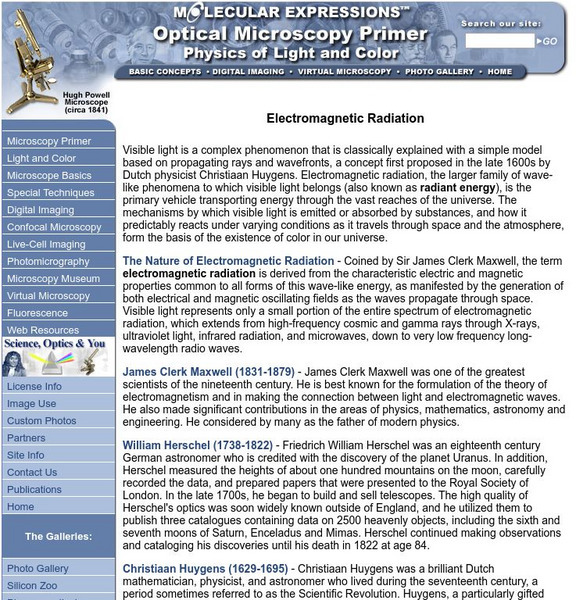Curated OER
Quantum Physics
Students discuss the mass-energy relationship based on Einstein's work. They calculate the energy released in various scenerios and sketch diagrams for the Lyman, Balmer and Pfund Series. In groups, they discuss the role of photons and...
Mathematics Vision Project
Module 6: Trigonometric Functions
Create trigonometric functions from circles. The first lesson of the module begins by finding coordinates along a circular path created by a Ferris Wheel. As the lessons progress, pupils graph trigonometric functions and relate them to...
Columbus City Schools
Making Waves
Learning about waves can have its ups and downs, but a demo-packed tool kit has the class "standing" for more! Learners gain experience with several different wave types, organizing observations and data, and wave...
Mathematics Vision Project
Module 7: Trigonometric Functions, Equations, and Identities
Show your class that trigonometric functions have characteristics of their own. A resource explores the features of trigonometric functions. Learners then connect those concepts to inverse trigonometric functions and trigonometric...
Virginia Department of Education
Greenhouse Gas Modeling Activity
Why are greenhouse gases called greenhouse gases? Young Earth scientists learn about greenhouse gases though experimentation in the second installment of a 3-part series. They use lamps to model radiant energy as well...
Mr. E. Science
Stars, Galaxies and the Universe
It takes 225 million years for our sun to travel around the galaxy. The presentation covers astronomical units, light years, telescopes, types of stars, the life cycle of a star, and types of galaxies. This is the last lesson in a...
Curated OER
Applied Science - Technology (5A) Lab
Fifth graders explore electromagnetic waves and light. In this light instructional activity, 5th graders draw the parts of a wave of the electromagnetic spectrum. They compare a flashlight to a laser to see how the light looks when...
Curated OER
Waves Worksheet
In this frequency worksheet, middle schoolers answer 10 questions about frequency and waves. The name of a teach appears at the top of this page.
Curated OER
Keep It Quiet!
Fourth graders study about sound waves and how they behave in various media. They create a soundproofed container. They explain that velocity describes a change in distance over time.
Curated OER
Computer Activity-The Sun
In this computer activity worksheet, students visit a website and take a Virtual Tour of the Sun. While navigating through the site, they complete 16 fill in the blank questions.
Curated OER
How Tsunamis Form
In this earth science instructional activity, students read and study facts about tsunami and earthquakes to complete 8 short answer questions that follow.
Curated OER
What Color is Chlorophyll?
Students observe the interactions of chlorophyll and light. They develop and form their own testable hypotheses. Students predict the color of chlorophyll in various types of plants.
Curated OER
Honors Chemistry I
In this honor chemistry I worksheet, students use all available resources to answer each question given. Students apply their knowledge of light, quantum theory of light, Bohr's model, photoelectric theory.
Curated OER
Atomic Theory
For this atomic theory worksheet, students use Planck's constant, Rydberg constant, and Avogadro's number to complete 20 multiple choice questions.
Curated OER
Do You Hear What I Hear?
Students study hearing and are able to differentiate between different sound waves. In this sound wave lesson students develop a cause and effect model that shows the parts of the ear.
Curated OER
Water Prism
Students using a glass prism filled with water are able to see all of the visible colors found the sunlight.
Curated OER
Planet Structure & Interior
Students compare Jupiter and Earth. In this Earth and space studies lesson, students compare the composition of Earth and Jupiter and analyze how the composition affects the rate at which the planets spin.
Curated OER
Jell-O Optics
Students observe an activity with Jell-O to learn about optics. In this investigative lesson students fill out a handout on the activity that helps them to investigate the index of refraction and the speed of light.
BBC
Bbc: Gcse Bitesize: General Properties of Waves
Light travels as waves. Waves can be described by their amplitude, wavelength and frequency. The speed of a wave can be calculated from its frequency and wavelength.
Florida State University
Florida State University: Molecular Expressions Microscopy Primer: Light and Color Refraction of Light
Comprehensive and sophisticated overview of light refraction includes an historical overview of the subject and explanations of the mathematics that underpin refractive indexes, the relative index of refraction, Snell's law, and light...
TeachEngineering
Teach Engineering: Waves and Wave Properties
Students learn about the types of waves and how they change direction, as well as basic wave properties such as wavelength, frequency, amplitude and speed. During the presentation of lecture information on wave characteristics and...
Florida State University
Florida State University: Molecular Expressions: Electromagnetic Radiation
This Florida State University page introduces light as an electromagnetic wave and discusses the frequency and wavelength range of the various regions of the electromagnetic spectrum. Includes links to some interactive Java applets.
Physics Classroom
The Physics Classroom: Sound Waves and Music: Sound Is a Pressure Wave
Students see illustrated diagrams and animations to help them understand the pressure characteristics of a sound wave.
Cornell University
Cornell University: Astronomy: Electromagnetism and Charge
This site from Cornell University provides a very short, very telling comparison of matter and charge. This is a good site to check out on the subject, with a chart diagram to help with further information.























